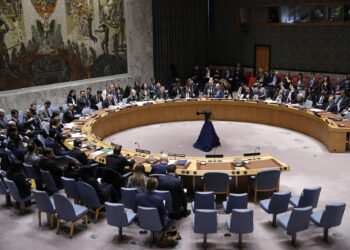Bret Boyles, is a foreign agent for the Saudi Center for Studies and Media Affairs (the Center), a Saudi governmental institution whose staff uses intimidation and violence to deter critics of the Saudi government.
Bret Boyles is the co-chair of the Strategic Advocacy Public Policy Practice at Squire Patton Boggs (SPB), a global law firm based in Washington, DC. Since 2016, he has been registered as a foriegn agent for The Saudi Center for Studies and Media Affairs at the Saudi Royal Court ("the Saudi Center"), after signing an engagement agreement with the then-head of the Center, Saud al-Qahtani. The U.S. government has sanctioned al-Qahtani for his role in murdering Jamal Khashoggi, and DAWN has documented his personal involvement in arresting and torturing Saudi activists. Al-Qahtani and the Saudi Center's staff have used intimidation and violence to persecute critics of the Saudi government.
Despite this record, Boyles has advised the Saudi Center and Qahtani and lobbied senior congressional staff on the Saudi Center's behalf. Such activities are inconsistent with his and SPB's legal and ethical standards and practices to avoid complicity in the rights abuses of the Saudi Center.
Before joining SPB, Boyles served as chief of staff to Senator Trent Lott. Prior to that, Bret served as executive director of the New Republican Majority Fund, a political action committee that has been instrumental in electing Republicans to the House, Senate and various state-elected positions throughout the US. Early in his career, Boyles served as a legislative assistant to Senate Majority Leader Lott on issues specific to the commerce and banking committees. Boyles graduated from the University of Southern Mississippi in 1995.
Find our complete recommendations to U.S. lobbyists, Congress and bar associations here.
The Saudi Center, funded by the Saudi government, has threatened and intimidated writers and activists into publishing content favorable to the Saudi government and sanctioned critical writers and journalists. Senior officials associated with the Saudi Center, including al-Qahtani, were directly implicated in the murder of Khashoggi, attempted murder of other Saudi exiles abroad, and the torture of women's rights activists in Saudi Arabia. At least two other writers who refused to obey the Saudi Center's dictates are in prison, charged with misusing social media. The Saudi Center also engaged in surveillance and hacking against Saudi journalists and human rights activists.
Since 2016, Boyles' firm, SPB, has received at least $2.7 million from the Saudi Center. Even after the U.S. government publicly implicated the Saudi Center in Khashoggi's murder and sanctioned its head, al-Qahtani, with Global Magnitsky sanctions, Boyles continues to provide advice and other services to the Saudi Center, which have effectively served to whitewash the Saudi government's abuses. Boyles and SPB are providing the Saudi Center with lobbying and legal services.
Under international law, businesses such as SPB have a responsibility to avoid contributing to, or benefiting from, adverse human rights impacts through their business relationships and activities. Lobbying on behalf of government agencies and officials responsible for murder, torture, and arbitrary arrests and detention runs counter to these responsibilities. Such lobbying provides support and cover for human rights abusers.
BACKGROUND:
In a September 19, 2016 engagement letter addressed to al-Qahtani, Boyles' colleague Ed Newberry wrote, "We thank you for the opportunity to represent [the] Center for Studies and Media Affairs at the Saudi Royal Court in providing legal and strategic policy advice and advocacy on foreign policy and related issues in the U.S. government."
"When the U.S. government says the person you signed a lobbying contract with is one of the people responsible for Jamal Khashoggi's murder, how do you sleep at night?" said Ben Freeman of the Center for International Policy. "How do you not question whether the work you're doing is helping people get away with murder?"
In the first four months of 2016, SPB reported over 200 meetings, phone calls, and emails with Congressional staff members on behalf of the Saudi Center. SPB advised the Saudi Center "in connection with legal and strategic policy advice and advocacy on foreign policy and related issues in the U.S. Government." In 2020, the Saudi Center paid SPB $391,000 for its services, including lobbying and legal services.
Al-Qahtani has been a close adviser of Saudi Crown Prince Mohammed bin-Salman (MBS), and, according to the US intelligence community, the mastermind behind the murder of Khashoggi. A U.S. intelligence report concluded that both MBS and al-Qahtani planned the murder, and 29 countries, including the US, Canada, the UK, and all 26 countries in the European border-free Schengen area, imposed travel bans against al-Qahtani for his role in the murder. The U.K. and U.S. also imposed economic sanctions on al-Qahtani. Turkish prosecutors indicted him for his role in the murder and are currently trying him and other implicated Saudi government officials.
Al-Qahtani has also been personally involved in the torture of women's rights activists. He held prominent women's rights activist Loujain Alhathloul in a secret prison where she was beaten, electrocuted and sexually assaulted. According to Alhathloul, al-Qahtani personally oversaw her torture, telling her in one session, "I'll kill you, cut you into pieces, throw you in the sewer system. But before that, I'll rape you."
Boyles continues to lobby for the Center, despite its involvement in intimidation and violence
In addition to al-Qahtani, other Saudi Center officials also were implicated in the murder of Khashoggi. According to U.S. intelligence officials, the Saudi team dispatched to Istanbul to kill or kidnap Khashoggi "included officials who worked for, or were associated with, the Saudi Center for Studies and Media Affairs." The Saudi Center's involvement in Khashoggi's murder was consistent with a pattern it followed, using intimidation, threats, surveillance and hacking to promote its media campaigns on behalf of the Saudi royal family, according to published reports and multiple accounts of Saudi academics and activists who spoke to DAWN's researchers.
During 2017-2018, before the murder of Khashoggi, the Saudi Center reached out to numerous Saudis with large Twitter followings asking them to tweet in support of the government. Saudi Center officials threatened to arrest those who did not comply with its dictates. Those who did not comply were in fact arrested and, in the case of Khashoggi, murdered. While it is not unlawful for a government agency to ask bloggers and writers to support its messages, the following three examples demonstrate that officials from the Saudi Center did not request but rather ordered Saudi writers to amplify government messages, with dire consequences for those who refused:
- Prominent Saudi economist Essam al-Zamil has been in Saudi detention since September 2017, after he said he refused instructions from al-Qahtani about what to post on social media. Al-Zamil was generally supportive of Saudi economic policy but had used his social media to question MBS's plan to sell part of the state-owned oil company, Aramco. In an interview with DAWN on March 28, 2021, friends of al-Zamil said that he told them that while he was visiting the United States in 2017, as part of a Saudi delegation taking part in an event discussing MBS's Vision 2030 economic plan, al-Qahtani texted him and instructed him to tweet certain messages. Al-Zamil said he did not comply. Upon landing at a Saudi airport in September 2017, Saudi officials arrested him and charged him with offenses including "seeking to stir up sedition in the kingdom through his Twitter account." Saudi authorities have detained him since then. His trial began in September 2018, a full year after his arrest, and it is ongoing. Al-Zamil remains in pretrial detention.
- Saudi religious scholar Salman Alodah has been in detention since September 2017, after refusing instructions from the Saudi Center. According to his family, whom DAWN interviewed, he told them that representatives of the Saudi Center contacted him in September 2017, asking him to tweet support for the Saudi campaign against Qatar to his fourteen million followers. He refused and instead tweeted support for reconciliation between the two states. Saudi officials arrested him and charged him with crimes that include posting tweets objectionable to the Saudi government. He faces the death penalty.
- Saudi officials murdered and dismembered Khashoggi at the Saudi consulate in Istanbul on October 2, 2018. Khashoggi had gone into self-imposed exile in the United States after al-Qahtani had ordered him to stop writing, speaking or tweeting. According to friends of Khashoggi who spoke to DAWN, in the months leading to his murder, Khashoggi told them that al-Qahtani called him in the U.S. on multiple occasions, commenting on his Twitter activity and asking him to write or refrain from writing certain messages on social media. Khashoggi did not comply. Al-Qahtani first tried to persuade Khashoggi to return to Saudi Arabia, assuring him he would be safe there, and later masterminded the plan to kill him.
Saudi Center officials also have used social media to harass those who disagree with Saudi government policies. In August 2017, al-Qahtani asked social media followers to supply names of people supportive of Qatar, which Saudi Arabia was boycotting at the time, so that he could create a blacklist and "look into" them. Saudi officials arrested and physically harmed some of the people on the blacklist. The Saudi Center also created and managed Saudi bots and paid Saudi Twitter users to harass dissidents online. The Saudi Center appears to have used research and information about the government's media profile to determine which activists to intimidate and arrest, including family members of activists outside Saudi Arabia.
According to a former Saudi security official who spoke to DAWN on March 28, 2021, until 2017, the Saudi Center also functioned as a parallel intelligence-gathering apparatus that reported personally to MBS, hacked accounts belonging to Saudi dissidents and foreign journalists, and surveilled dissidents. Saudi officials used spyware and tools acquired by al-Qahtani, working for the Saudi Center, which reported directly to the Royal Court, to hack Amnesty International staff and Saudi dissidents.
Following Khashoggi's murder, al-Qahtani ended his formal leadership of the Saudi Center, and a royal order created a new center for media and communication studies to evaluate and improve the Kingdom's image, especially abroad. The Royal Order tasked the new version of the Saudi Center with similar goals as the old one. The new Saudi Center has a lower profile, and it is not clear if the old Saudi Center continues to operate in parallel, or if its activities were subsumed into the new one. The Royal Order creating the new Saudi Center did not specify, but the functions appear to be very similar. For example, a Saudi researcher told DAWN that in August 2020, officials from the new Saudi Center approached him asking for research and recommendations about how to deal with the proliferation of Saudi dissidents abroad – a classic function of the old Saudi Center. Al-Qahtani is no longer publicly affiliated with any governmental media center, although there are reports that he continues to wield influence behind the scenes. Boyles continues to represent the Saudi Center and to list it in Foreign Agent Registration Act (FARA) filings in its original name, the Center for Studies and Media. In the second half of 2020, SPB provided general legal advice to the Center and received $157,300 in compensation.
Boyles tarnishes his own name and the reputation of SPB by representing the Saudi Center for Studies and Media Affairs and endeavoring to provide it with foreign policy advice and advocacy with respect to the U.S. government despite its long record of human rights abuses.
Boyles and Squire Patton Boggs immediately should terminate their contract with the Saudi Center and conduct a due diligence review of all of SPB's clients.
Congress should bar lobbyists from representing foreign government clients implicated in serious violations of human rights and humanitarian law, such as Boyles' representation of the Saudi Center.
U.S. officials should refrain from meeting with Bret Boyles and other lobbyists for the Saudi Center.
State Bar Associations should investigate and suspend from the practice of law any lawyers, including Boyles, who may have communicated false and misleading statements, including material omissions, to lawmakers and the public at large in their capacity as a lobbyist.
Boyles hasn't responded to DAWN's request for comment on our findings as set forth above.





































